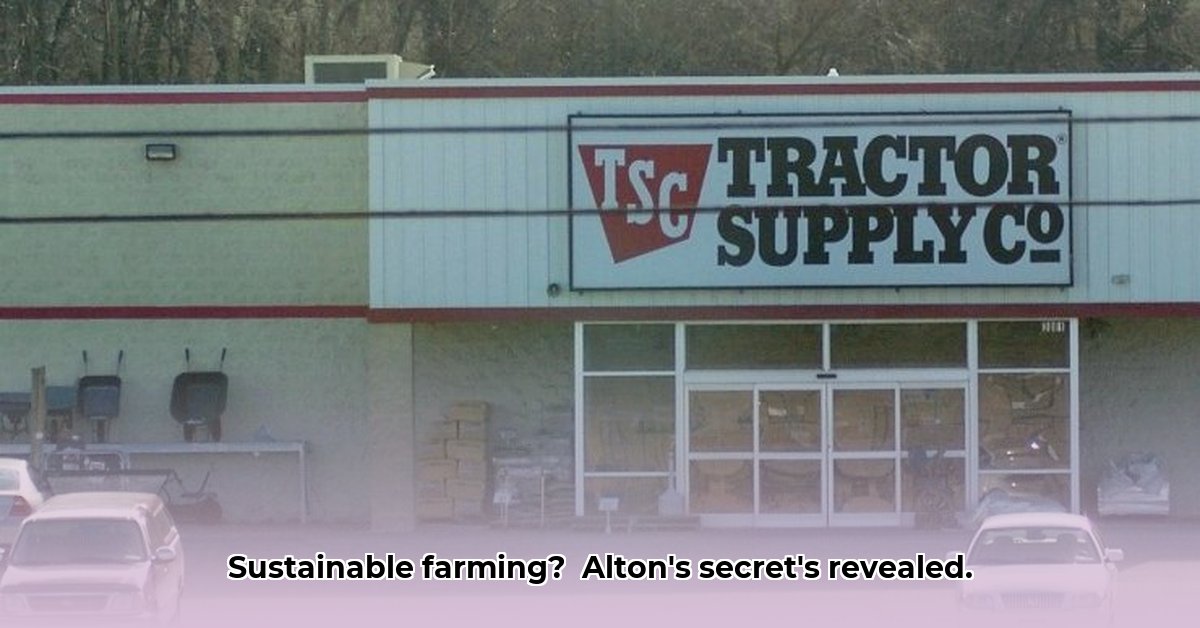
Tractor Supply (TSC) in Alton, Illinois, plays a pivotal role in the local agricultural landscape, providing farmers and gardeners with essential supplies. But how does its impact on sustainable farming truly measure up? This article delves into the intricate relationship between TSC, sustainable practices, and the Alton community, exploring both the positive and negative aspects. We’ll hear from local farmers and offer actionable steps towards a greener future for Alton's agricultural sector. For more information on similar stores, check out this example store.
Tractor Supply's Impact on Sustainable Agriculture in Alton
TSC's presence in Alton offers undeniable benefits. Its accessibility provides crucial supplies to local farmers and gardeners, potentially reducing reliance on larger, more distant operations often associated with higher transportation costs and less sustainable practices. This local access empowers food production, strengthens the local economy, and increases community food security. But is this convenience a wholly positive story? The answer, like the soil itself, is multifaceted.
Weighing the Environmental Pros and Cons
TSC's impact on sustainable agriculture in Alton is a complex interplay of positive and negative factors.
Positive Impacts:
- Accessibility: TSC's convenience allows smaller farms and home gardeners easier access to essential supplies, enabling local food production and reducing reliance on larger, less sustainable farms further away. This directly supports food security and reduces transportation-related emissions.
- Empowerment: TSC provides the resources needed for smaller operations to thrive, fostering agricultural diversity and resilience within the Alton community. A diverse agricultural landscape is generally more robust and less vulnerable to shocks.
- Product Variety: A wide range of products, from seeds and fertilizers to equipment and animal feed, offers consumers choices – including, increasingly, more sustainable options. The availability of such choices is crucial for driving sustainable consumer purchasing decisions.
- Economic Contribution: TSC's presence creates local jobs and contributes to the overall economic vitality of Alton, indirectly supporting sustainable initiatives within the wider community.
Negative Impacts:
- Carbon Footprint: The transportation and logistics involved in delivering goods to TSC and then to consumers create a substantial carbon footprint. This must be considered when assessing its overall environmental impact.
- Sourcing Concerns: The origin and production methods of some products sold at TSC might not always align with sustainable practices. This necessitates greater transparency and commitment from TSC to sourcing sustainable products.
- Lack of Transparency: TSC's sustainability efforts could benefit from greater transparency, providing consumers with clearer information about the environmental impacts of its products and supply chains. This would allow for better consumer decision-making and potential pressure for improvement.
- Limited Sustainability Focus: While TSC offers some sustainable products, there's potential for a more proactive role in promoting and supplying cutting-edge sustainable technologies and practices.
Are you questioning the overall effect of TSC's readily available products on the Alton ecosystem? A deeper dive is necessary to provide a complete picture.
A Localized Analysis: Alton's Specific Context
Fully understanding TSC's influence requires understanding Alton's unique agricultural context. What are the prevalent farming practices? How does the community rely on TSC for supplies? Does TSC actively promote sustainable farming techniques in Alton? Does TSC's location increase access to local seeds, for example, or does it primarily prioritize more widely available options that may have a larger carbon footprint? These questions help paint a more detailed picture of the localized impact.
Actionable Steps Towards a Greener Future
The complexities of TSC's impact necessitate a collaborative approach to enhance sustainability.
1. Tractor Supply's Role:
- Comprehensive Environmental Assessment: A thorough analysis of their environmental footprint, publicly released, is essential. This should include both direct and indirect impacts.
- Robust Sustainability Strategy: This strategy should include SMART (Specific, Measurable, Achievable, Relevant, Time-bound) goals for reducing their environmental impact, supported by measurable progress reporting.
- Promotion of Sustainable Practices: Active promotion of sustainable practices through educational materials and in-store initiatives.
2. Actions for Alton Farmers and Gardeners:
- Prioritizing Sustainable Products: Choosing eco-friendly products including organic fertilizers and locally sourced seeds.
- Collaborative Purchasing: Pooling resources for bulk purchases of sustainable supplies to reduce transportation impacts.
3. Consumer Responsibility:
- Informed Choices: Careful reading of product labels and supporting businesses committed to sustainable practices.
- Supporting Local Producers: Actively supporting local businesses and farmer's markets.
4. Local Government Involvement:
- Incentivizing Sustainability: Offering financial incentives or grants to farmers adopting sustainable methods.
- Investing in Sustainable Infrastructure: Improving transportation or providing access to renewable energy sources.
Conclusion: A Shared Responsibility for Sustainable Agriculture
The future of sustainable agriculture in Alton hinges on a collaborative effort. By working together, TSC, farmers, consumers, and local government can create a system that benefits both the community and the environment. The journey towards sustainability is ongoing and requires constant evaluation and adaptation.